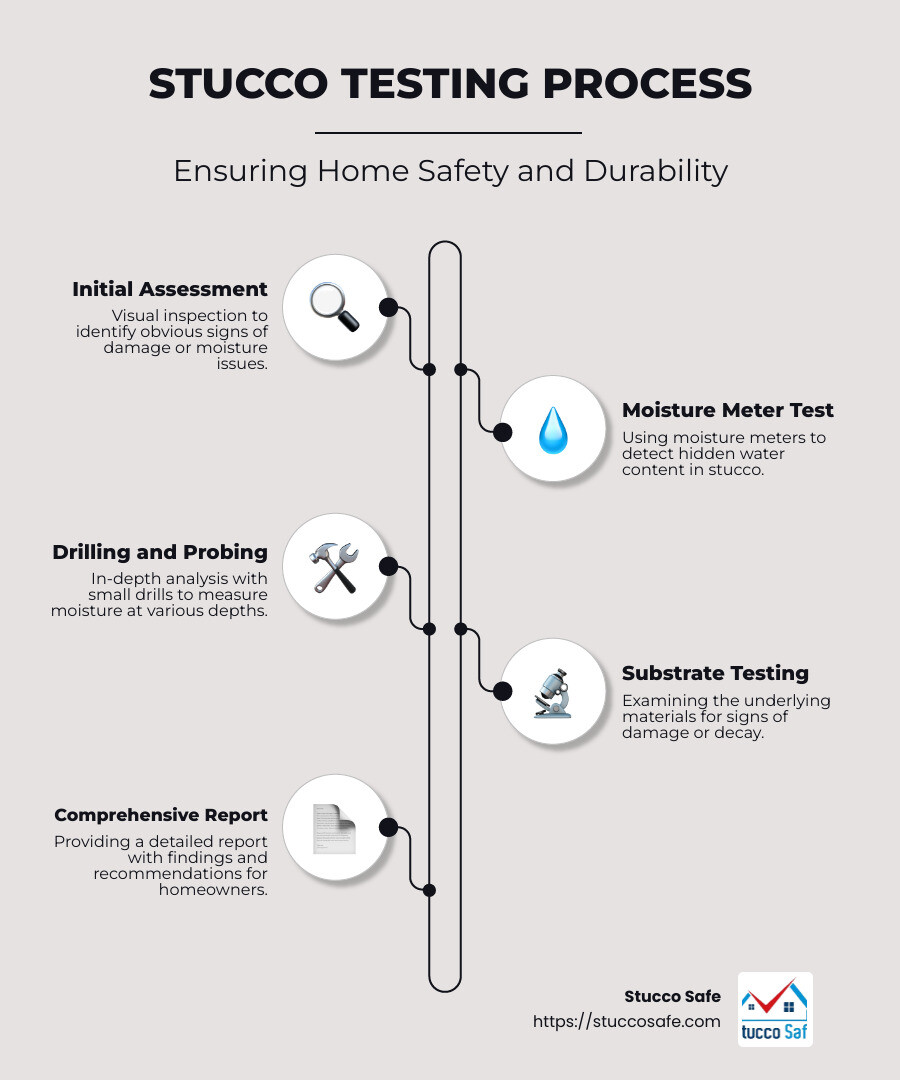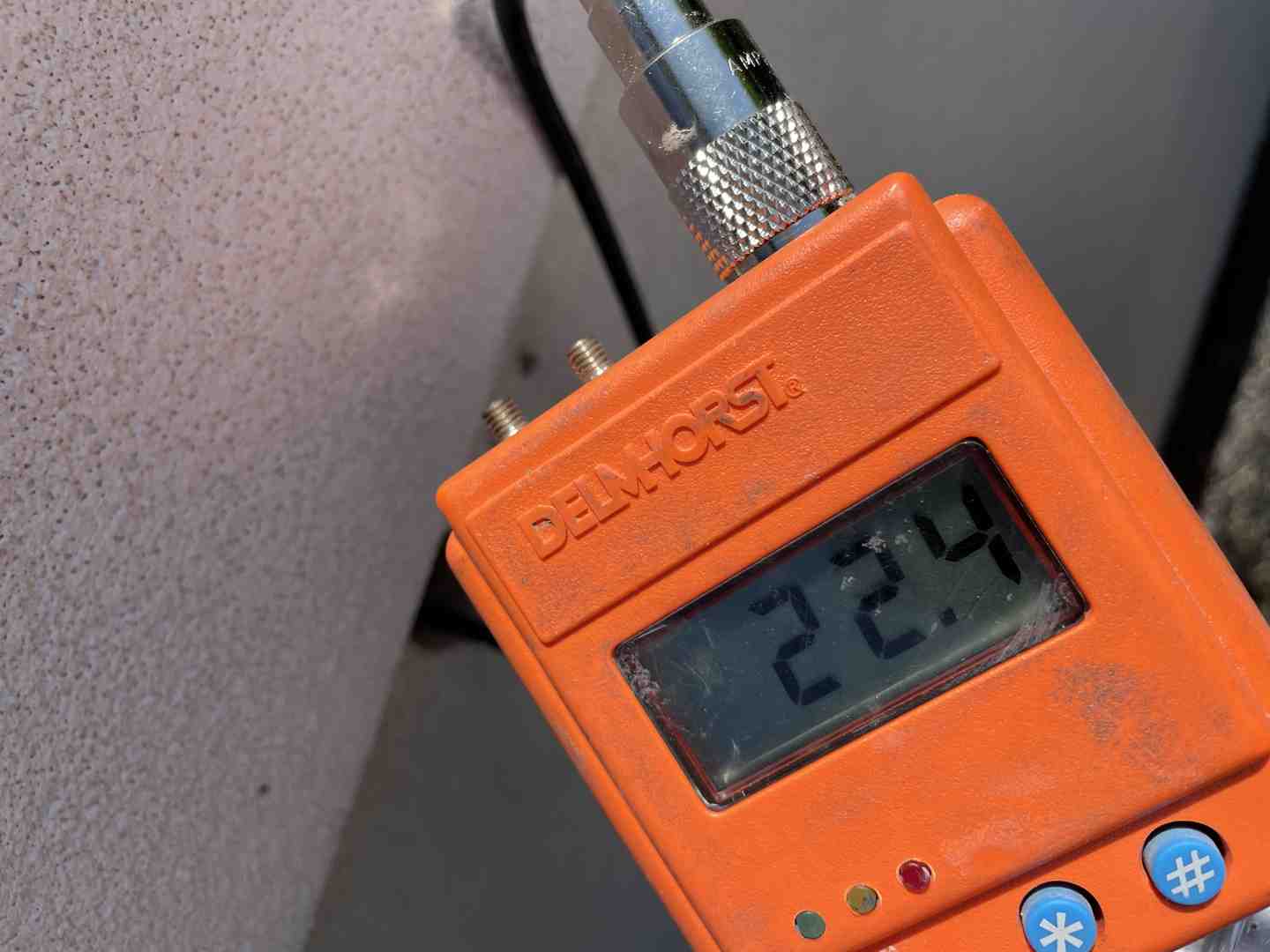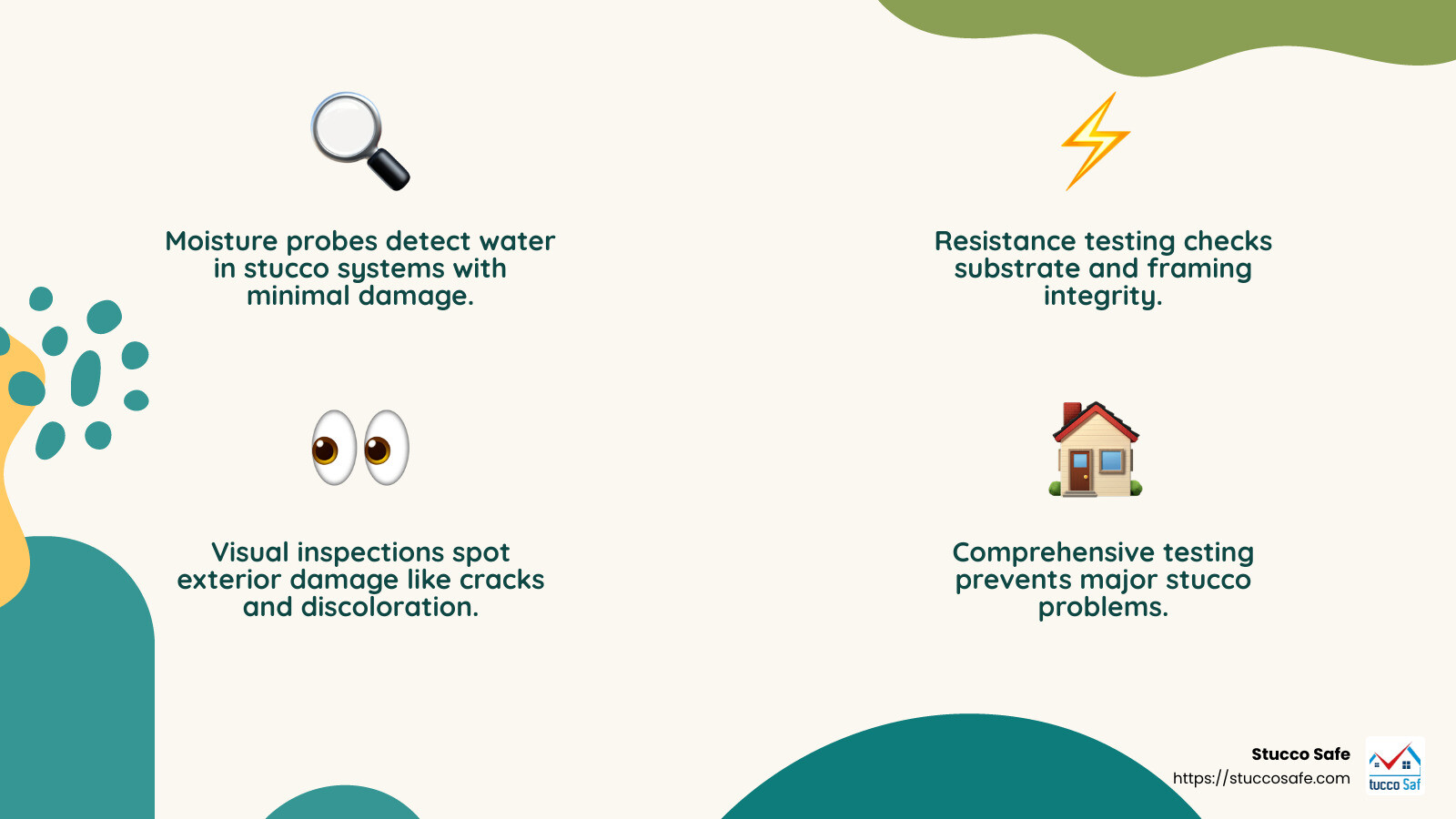Stucco Testing PA is crucial for homeowners, who want to ensure the safety and durability of their homes. Whether considering selling your property or simply maintaining its integrity, stucco inspections offer peace of mind by identifying potential issues early. Additionally, we offer commercial stucco inspection services, emphasizing our expertise in assessing stucco in commercial properties. Here’s why it matters:
- Moisture Detection: Critical in preventing hidden structural damage.
- Real Estate Transactions: Essential for buyers and sellers to avoid unexpected costs.
- Cost of Inspection: Typically ranges from $495 to $1,595, based on home size.
- Frequency of Testing: Recommended every 5 years for homes in Southeastern Pennsylvania, given weather impacts and historical issues.
I’m Gabe Kesslick, founder of Stucco Safe. With over two decades in moisture detection and stucco inspections, I am dedicated to providing thorough assessments and clear guidance.
Importance of Stucco Testing
Stucco testing is vital for maintaining the integrity and value of your home, especially in areas like Pennsylvania where weather conditions can be harsh. Here’s why it’s essential:
Exterior Moisture
Moisture is the enemy of a stucco facade. A common stucco moisture problem in Pennsylvania has led to significant financial burdens for homeowners, with repairs often reaching tens of thousands of dollars. When water seeps behind the stucco, it can cause extensive damage to the underlying structure. This is particularly concerning in Pennsylvania, where frequent rain and humidity can exacerbate moisture issues. Detecting moisture early prevents costly repairs and maintains the structural health of your home.
Hidden Problems
A challenge with stucco is that problems often remain hidden until they become severe. Many of these hidden issues are due to improperly installed stucco, which can lead to mold growth, wood rot, and even structural failure beneath the surface. Regular Stucco Testing PA helps uncover these hidden problems before they escalate, saving homeowners from unexpected expenses and potential safety hazards.
Building Envelope
The building envelope is the barrier between the interior of your home and the outside elements. As a durable and visually appealing option for exterior siding, stucco plays a crucial role in maintaining this barrier. A compromised envelope due to stucco failure can lead to energy inefficiency, increased utility bills, and uncomfortable living conditions. By conducting thorough stucco inspections, you ensure that your building envelope remains intact, protecting your home from Pennsylvania’s unpredictable climate.
Stucco testing is not just about maintaining appearances; it’s about safeguarding your investment and ensuring the longevity of your property. Next, we’ll dig into how stucco testing is conducted to address these critical issues.
Understanding Stucco Failure
Stucco failure can occur due to various reasons, including improper installation, inadequate maintenance, and exposure to harsh weather conditions. When water enters behind the stucco and gets absorbed into the sheathing and framing, it can lead to hidden damage, including rotting of the substrate and framing. This can eventually cause the stucco to crack, crumble, or even collapse. Understanding the causes of stucco failure is crucial to preventing and addressing these issues.
How Stucco Testing is Conducted
Stucco testing is a meticulous process designed to uncover hidden issues and ensure the health of your home’s exterior. An invasive stucco inspection is crucial for verifying moisture intrusion and assessing damage, highlighting the thoroughness of the inspection and its role in ensuring the integrity of the home. Here’s how it’s done:
Moisture Probes
Moisture probes are a key tool in stucco testing. They help detect moisture levels within the stucco system. Inspectors drill small, inconspicuous holes into the stucco, usually 1/4 of an inch, to insert these probes. This allows them to measure the moisture content behind the stucco without causing significant damage. The data collected helps assess whether water has infiltrated the substrate and framing, which is crucial for identifying potential water damage.
Invasive Stucco Inspection
Resistance testing complements moisture probing by evaluating the integrity of the substrate and framing. This technique involves inserting a resistance probe into the drilled holes to measure the structural soundness of the materials behind the stucco. If the materials show signs of weakening, it could indicate underlying issues that need attention. This step is essential for detecting potential structural failures that are not visible from the outside.
Visual Inspection
A visual inspection is the starting point of any stucco testing process. EDI certified stucco inspectors play a crucial role in conducting thorough visual inspections and ensuring accurate assessments. Certified inspectors examine the entire exterior surface for signs of damage, such as cracks, discoloration, or missing building details like expansion joints and weep screeds. They also check the condition of caulk joints and sealants around penetrations. Visual inspections help identify obvious problems and guide the placement of moisture probes for more detailed analysis.
By combining these methods, Stucco Testing PA professionals can provide a comprehensive assessment of your stucco system. This thorough approach ensures that any potential issues are identified and addressed before they escalate into major problems.
Next, we’ll explore the common stucco issues that homeowners in Pennsylvania face and how these tests help mitigate them.
Invasive Testing and Sampling
Invasive testing and sampling are essential components of a comprehensive stucco inspection. This involves drilling small holes into the stucco and inserting a moisture probe to detect any hidden moisture. The probe measures the moisture content of the substrate and framing, providing valuable insights into the health of the stucco system. Additionally, sampling involves collecting small core samples of the stucco and substrate to examine their condition and identify any signs of damage or deterioration.
Common Stucco Issues in Pennsylvania
Stucco is a popular choice for home exteriors in Pennsylvania, but it comes with its own set of challenges. Professional stucco inspections are crucial in identifying potential stucco problems that may be missed by regular inspectors. Here are some common issues that homeowners face:
Water Damage
Water damage is a major concern with stucco, especially in Pennsylvania’s climate. The state experiences heavy rainfall, which can lead to moisture seeping behind the stucco. This trapped moisture can cause wood rot, mold growth, and even structural damage over time. Moisture meters and infrared cameras are essential tools for detecting these hidden problems early.
Inadequate Drainage
Many stucco failures are linked to inadequate drainage systems. When stucco is installed without proper drainage, water can accumulate behind the walls. This not only leads to water damage but can also cause the stucco to crack or peel. Homes built between 1993 and 2006 are particularly vulnerable due to outdated building codes that didn’t emphasize adequate drainage.
Structural Failure
Structural failure is another significant issue. When water infiltrates the stucco and reaches the sheathing and framing, it can weaken these critical components. Over time, this can lead to serious structural problems, potentially compromising the safety of the home. Resistance testing is crucial in identifying such weaknesses before they develop into catastrophic failures.
Regular stucco testing can help identify these issues early, preventing costly repairs and maintaining the integrity of your home. In the next section, we will address frequently asked questions about stucco testing, including costs and inspection requirements.
Commercial Stucco Inspections
Commercial stucco inspections are critical for ensuring the integrity and safety of commercial buildings with stucco exteriors. These inspections involve a thorough examination of the stucco system, including its installation, condition, and performance. Commercial stucco inspections can help identify potential issues, such as moisture intrusion, structural damage, and safety hazards, allowing building owners and managers to take proactive measures to address these problems.
Benefits of a Professional Stucco Inspection
A professional stucco inspection offers numerous benefits, including:
- Early detection of potential issues, reducing the risk of costly repairs and safety hazards
- Identification of hidden problems, such as moisture intrusion and structural damage
- Provision of detailed reports and recommendations for repair and maintenance
- Enhancement of property value and marketability
- Compliance with building codes and regulations
What to Expect from a Stucco Inspection Report
A stucco inspection report provides a comprehensive summary of the inspection findings, including:
- A detailed description of the stucco system, including its installation, condition, and performance
- Identification of any defects, damage, or safety hazards
- Recommendations for repair, maintenance, and improvement
- Photos and diagrams to illustrate the findings and recommendations
- A summary of the inspection process and methodology used
A professional stucco inspection report is an essential tool for property owners, managers, and buyers, providing valuable insights into the condition and performance of the stucco system.
Frequently Asked Questions about Stucco Testing
How much does it cost to test stucco?
The cost of Stucco Testing in PA can vary based on several factors, including the size of your home and the extent of the inspection required. Typically, prices range from $495 to $1595 or more for very large homes. This range covers a comprehensive inspection that includes moisture testing, resistance testing, and a thorough visual examination.
Stucco Safe operates in various locations across Pennsylvania, New Jersey, and Delaware, ensuring you have access to quality stucco inspection services no matter where you are within these areas.
How do you test for stucco?
Stucco testing involves a combination of techniques to accurately assess the condition of the stucco and the underlying structures. Here’s a quick rundown:
Testing various stucco applications is crucial to ensure their integrity and durability.
- Moisture Meter: Our inspectors use advanced moisture meters, like the Extech, to measure moisture levels in the substrate. This tool provides precise readings, helping to identify areas where moisture may be causing damage.
- Drilling Holes: Small, inconspicuous holes (about 3/16th of an inch) are drilled into the stucco at strategic points. These holes allow for the insertion of moisture probes and are sealed with color-matching caulk once the testing is complete.
- Substrate Testing: Resistance probes are used to check the integrity of the substrate and framing behind the stucco. This step is crucial for detecting any structural weaknesses.
- Visual Inspection: A certified inspector will also conduct a thorough visual check to assess the exterior facade for any visible signs of damage or inadequate building details.
Does stucco need to be inspected?
Yes, regular stucco inspections are essential to maintain the health of your home’s exterior. Here’s why:
- Inspection Requirements: Stucco, like any building material, can deteriorate over time, especially if it wasn’t installed correctly or if the drainage systems are inadequate. Regular inspections help catch these issues early.
- Yearly Inspections: It’s recommended to have your stucco inspected at least once every two years. However, if your home is older or has shown signs of wear, more frequent checks may be necessary.
- Visual Checks: In addition to professional inspections, homeowners should perform regular visual checks for any signs of cracks, discoloration, or mold. These can be early indicators of underlying problems.
Routine stucco testing not only helps prevent costly repairs but also ensures the safety and value of your home. Now, let’s dig deeper into the certified inspection processes and the forensic testing methods used by Stucco Safe.
Conclusion
At Stucco Safe, we pride ourselves on offering top-notch stucco inspection and testing services for homeowners and property buyers in Pennsylvania, New Jersey, and Delaware. Our approach is rooted in expertise and precision, ensuring your stucco is not just inspected, but thoroughly understood.
EDI Certified Stucco Inspectors
Our team consists of certified inspectors who are trained to identify even the most hidden issues. Stucco testing specialists play a crucial role in conducting thorough inspections and ensuring the integrity of the stucco structure. With certifications from respected organizations like the Exterior Design Institute and the Building Envelope Science Institute, our inspectors bring a wealth of knowledge and experience to each inspection. This ensures that every assessment is both accurate and reliable.
Forensic Testing Methods
We employ cutting-edge forensic testing methods to offer comprehensive evaluations of your stucco. This includes the use of advanced tools like moisture meters and thermal imaging cameras. These technologies help us detect moisture intrusion and structural issues that are invisible to the naked eye. By uncovering these hidden problems, we help you avoid costly repairs and maintain the integrity of your home.
Why Choose Stucco Safe?
Choosing Stucco Safe means choosing peace of mind. Our detailed reports provide clear insights into the condition of your stucco, complete with photographs and data to back up our findings. We focus solely on inspection and testing, ensuring unbiased assessments free from any repair service agendas.
By opting for our services, you not only safeguard your property but also make informed decisions about maintenance and potential improvements. Our commitment to exceptional customer service means we’re always here to guide you through the process, answering any questions you might have.
In summary, regular stucco inspections are vital for maintaining your home’s exterior. With Stucco Safe, you get expertise, advanced technology, and a customer-focused approach that ensures your home remains safe and sound for years to come.




